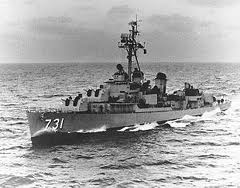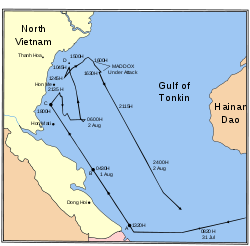Gulf of Tonkin
 Monday, February 13, 2012 at 6:00AM
Monday, February 13, 2012 at 6:00AM Another example of a false flag was the Gulf of Tonkin incident that preceded the Vietnam War.
 The Gulf of Tonkin Incident, or the USS Maddox Incident, are the names given to two separate confrontations, one actual and one now recognized as non-existent, involving North Vietnam and the United States in the waters of the Gulf of Tonkin. On August 2, 1964, the destroyer USS Maddox, while performing a signals intelligence patrol as part of DESOTO operations, engaged three North Vietnamese Navy torpedo boats of the 135th Torpedo Squadron. A sea battle resulted, in which the Maddox expended over two hundred and eighty 3-inch and 5-inch shells, and in which four USN F-8 Crusader jet fighter bombers strafed the torpedo boats. One US aircraft was damaged, one 14.5 mm round hit the destroyer, three North Vietnamese torpedo boats were damaged, and four North Vietnamese sailors were killed and six were wounded; there were no U.S. casualties.
The Gulf of Tonkin Incident, or the USS Maddox Incident, are the names given to two separate confrontations, one actual and one now recognized as non-existent, involving North Vietnam and the United States in the waters of the Gulf of Tonkin. On August 2, 1964, the destroyer USS Maddox, while performing a signals intelligence patrol as part of DESOTO operations, engaged three North Vietnamese Navy torpedo boats of the 135th Torpedo Squadron. A sea battle resulted, in which the Maddox expended over two hundred and eighty 3-inch and 5-inch shells, and in which four USN F-8 Crusader jet fighter bombers strafed the torpedo boats. One US aircraft was damaged, one 14.5 mm round hit the destroyer, three North Vietnamese torpedo boats were damaged, and four North Vietnamese sailors were killed and six were wounded; there were no U.S. casualties.
As you can see from this quote in Wikipedia, it is not even in dispute that part of the Gulf of Tonkin "incident" never happened. The part that did happen is interesting. The intelligence-gathering ship entered waters claimed by North Vietnam. The Maddox fired first. The presence of the ship in these waters was designed to "test Vietnamese resolve." So the Johnson Administration claim that the Vietnamese fired first was a lie.
Here is a quote from document declassified in 2005.
At 1500G, Captain Herrick (commander of the Maddox) ordered Ogier's gun crews to open fire if the boats approached within ten thousand yards. At about 1505G, the Maddox fired three rounds to warn off the communist boats. This initial action was never reported by the Johnson administration, which insisted that the Vietnamese boats fired first.
And as for the supposed second incident:
It is not simply that there is a different story as to what happened; it is that no attack happened that night. [...] In truth, Hanoi's navy was engaged in nothing that night but the salvage of two of the boats damaged on August 2.
 US Government's Version of the Journey of the MaddoxWhile the Maddox was in international waters, it was within the waters claimed by Vietnam. The Maddox was sent into these waters on purpose. Was it hoped that Vietnam would attack to give Johnson the pretext he wanted to intervene in the Vietnamese civil war? We do not know—but the pattern of all these wars I have talked about would indicate yes.
US Government's Version of the Journey of the MaddoxWhile the Maddox was in international waters, it was within the waters claimed by Vietnam. The Maddox was sent into these waters on purpose. Was it hoped that Vietnam would attack to give Johnson the pretext he wanted to intervene in the Vietnamese civil war? We do not know—but the pattern of all these wars I have talked about would indicate yes.
Why don't more politicians stand up against all the wars? The example of Senators Kerry and Clinton show the problem.
Clinton supported the Iraq war. It was a position that she staked out, probably in consultation with her husband, designed to make her more electable when she ran for president. Support of these wars is all about politics. Ironically her support of the war was a factor in her defeat in the Democratic primaries in 2008. To make it even more ironic, Obama opposed her position, and then once elected adopted it.
Kerry had a tough choice as well. So he tried to be on both sides of the issue at once. This led to his famous quote, "I was in favor of the war, before I was against it." But that is not exactly what he said:
Voting for or against one particular bill does not tell us a lot about a person's position, but the die was cast of Kerry as a "flip-flopper." He was doomed.
Why don't politicians stand up when these false flag incidents occur? The career of Wayne Morse highlights this:
While President Johnson’s final resolution was being drafted, Senator Wayne Morse attempted to hold a fundraiser to raise awareness about possible faulty records of the incident involving the USS Maddox. Morse supposedly received a call from an informant who has remained anonymous urging Morse to investigate official logbooks of the Maddox. These logs were not available before President Johnson’s resolution was presented to Congress.
After urging Congress that they should be wary of President Johnson’s coming attempt to convince Congress of his resolution, Morse failed to gain enough cooperation and support from his colleagues to mount any sort of movement to stop it. Immediately after the resolution was read and presented to Congress, Morse began to fight it. He contended in speeches to Congress that the actions taken by the United States were actions outside of the constitution and were “acts of war rather than acts of defense."
Morse’s efforts were not immediately met with support, largely because he revealed no sources and was working with very limited information. It was not until after the United States became more involved in the war that his claim began to gain support throughout the United States government. The controversial Morse was defeated when he ran for re-election in 1968.
Here is a you tube clip about the Gulf of Tonkin incident from 60 minutes, done at that time. President Johnson, Senators Fulbright and Morse are featured.
Here is another clip that features Admiral Stockdale, who says nothing happened on the second day.
The example of Wayne Morse is that if you oppose wars, you get defeated. We need more politicians who do not care about this, but value the truth more. And yes, I realize that the term "truthful politician" is an example of an oxymoron.
 Politics,
Politics,  Propaganda,
Propaganda,  War
War 
Reader Comments